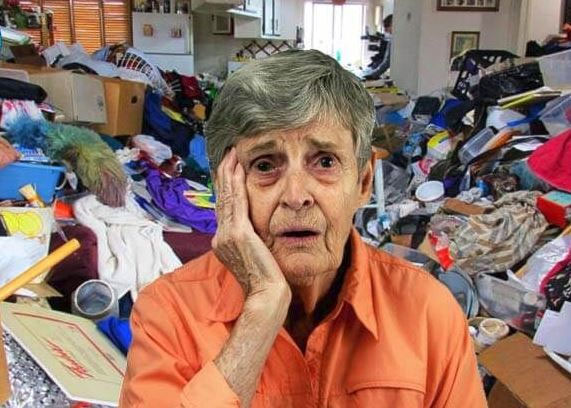Elderly Hoarders: 5 Compassionate Ways to Help
Excessive Treasures or Junk?
To you it’s clutter. To them, they’re valuables. Maybe excessive treasures.
The sight of ‘junk’ blocking hallways and piling up in each room disgusts you.
Stacks of paper everywhere cause worry about fire hazards.
The odor sickens you. You gag. Gasp. Cry.
You’re Angry! You have been here in this exact place so many times.
You’re embarrassed, and maybe even ashamed, that your parents live here. They ‘caused’ this.
You’ve stopped visiting as the piles of treasures began growing.
Your children, their grandchildren, have never visited.
You deem their home unsafe, and them unstable.
You beg, hope and pray for it to stop and to go away.
It doesn’t.
They remain socially isolated and lonely in what you call squalor.
Hoarding Disorder
Hoarding Disorder is a clinical diagnosis.
Did you know that up to 1 in 20 of the elderly have tendencies that are consistent with hoarding?
A study by researchers at Johns Hopkins revealed that about 4 percent of the population as a whole shows hoarding behavior, but that percentage goes up to 6.2 in people over 55.
It has emotional, physical, and even financial or legal implications.
Hoarding can have a devastating impact on older adults:
- Risk for falling: Will emergency workers be able to reach them after a fall, or anytime?
- Poor hygiene: Is the bathtub/shower full of papers or empty bags?
- Fires, mold and mildew in the home
- Poor nutrition: Spoiled food can cause foodborne illness.
- Rodents and insects in the home
- Utilities. Air conditioning, heat and running water. Are they turned off? The freezing cold is as dangerous as the heat.
- Other medical problems, including depression
It can also indicate the presence of Alzheimer’s, dementia or mental illness.
5 Ways to Help Elderly Hoarders
- Join them for a medical evaluation
Since hoarding is almost always connected to mental health or other health conditions, it’s likely your parent may need professional help. Schedule a full medical evaluation for them and then go to the appointment and any follow-up visits. Learn if their hoarding behavior is caused by dementia, Alzheimer’s or other neurological condition. If not, psychiatric care may be needed.Denise Craft of Craft Lifestyle Management, who has worked for over 30 years with elderly hoarders, says all hoarders have a “dis-ease” of the soul from this learned behavior.
- Start small and make it a special event
Acknowledge that the process of decluttering your parent’s home is going to be hard and require a ton of patience. Bring a good attitude and try to make it conflict-free. Perhaps you can call it “Memories Monday” or “Super Saturday.” Keep it positive.Remember, every single item, down to the scraps of paper, IS important to them.Agree you’re going to stick to a weekly calendared date and identify which room will be worked on for each date.For instance, start in the bathroom and remove expired medications and old make-up. Or the stairways where you remove stacks of papers and shoes, etc.Be sure to acknowledge their ability to let go of these items, many hazardous to their well-being. Keep in mind, each item they’re willing to discard takes a lot out of them and may be considered a victory. Show them they can do it, together.And, of course, never start decluttering without their cooperation.
Sort with a System
Remember, coming into their home causes stress and chaos in their already chaotic life. They may feel threatened and find many excuses not to proceed. Be gentle, kind, compassionate, and always patient.In addition to identifying the day of the week for sorting and decluttering, also set up areas where sorted items will be placed:
· Charitable donations
· Valuables and keepsakes
· Trash
It does not help the soul to contribute to the hoarding behavior by agreeing to rent a storage unit for your parent during this sorting and decluttering process.
There are ways to negotiate with them on this specific topic.
Keep the focus on their safety and your concern for them.
- Acknowledge sentimental itemsMany hoarders hang on to items because they consider them unique and irreplaceable, attaching great sentimental value to the item.Listen to the story and/or the memory of the item. Ensure it doesn’t have great monetary value. If not, suggest taking a photo of the item to keep the memory alive rather than keeping the item. Again, be patient. This process takes time and assurance.
- Hire an outside company
Sometimes the clutter and the family dynamics and emotions are too much for loved ones to handle.Walking into this environment can cause ‘paralysis’ Not knowing where, or how, to begin.Craft Lifestyle Management has been assisting families in these situations for years.
We are trained and experienced in handling excessive treasure situations with care and compassion for both your loved one and you.
Learn More:
Definition of late life compulsive hoarding:
https://www.ncbi.nlm.nih.gov/pmc/articles/PMC4083761/
What is hoarding disorder?
https://www.psychiatry.org/patients-families/hoarding-disorder/what-is-hoarding-disorder
© June 2020. Craft LifeStyle Management.
Denise Craft founded Craft Lifestyle Management in 1988 to ease the burden for families of aging, veterans, special needs adults and those in rehab during times of transition. She understands what’s involved in transitioning any individual from their personal home to their next home and to end of life. Her seasoned knowledge of available placement services, housing options, eligible benefits and payor sources, and community resources is endless.
Please contact Craft LifeStyle Management for all of your transitional needs.


